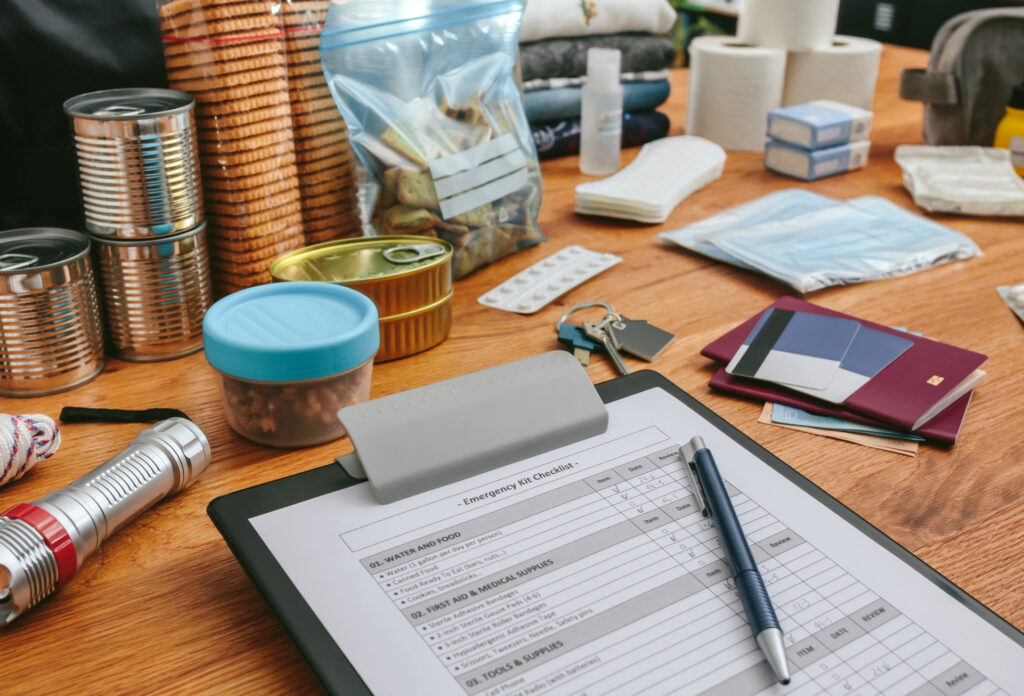Everyone does prepping on some level, whether keeping documents arranged in case of an emergency or keeping some medical supplies on hand in case they’re needed. Those who want to ensure they’re prepared for everything may have a few more supplies than the average person. When the goal is to be prepared for anything that could happen, it’s important to know what to have on hand and how to store everything so it’s accessible in an emergency.
Consider Why You’re Prepping
Take a moment to think about why you’re prepping and what you want to accomplish. Consider the potential natural disasters or other types of emergencies that can happen in your area. If the area has never had an earthquake, you likely don’t need to prepare for one. On the other hand, if you live in an earthquake-prone area, it’s a good idea to consider this while gathering and storing supplies. Check out sites like Prepared Bee to learn about some of the supplies available that you might need.
Basic Necessities
Basic necessities are essential to have on hand if you’re without power or water for some time due to an emergency. This should include a robust first aid kit, shelf-stable food, and water. To add to this, consider filtration devices in case you start to get low on water, seeds to grow food if you’re without supplies for an extended period of time, and freeze-dried meals that can be stored for years and still be safe to eat. All of these items should be stored properly to ensure they’re safe to use when needed.
Storage Supplies
Keeping everything organized is vital to prevent items from going bad or being ruined if something happens. Some of the options to consider making storage easier include the following.
- Waterproof Containers: Waterproof containers can help keep supplies air-tight and away from rain, leaks, flooding, and other causes of water damage. Use these containers for the essentials and anything that could be ruined if wet.
- Fireproof Containers: Fireproof containers are resistant to fires, so the items inside them will still be safe even if there is a fire in the home. Keep essential documents and extra cash in fireproof containers.
- Off-Floor Shelving: Shelving is necessary if you store more than a few supplies. Opt for metal or other sturdy shelving with space underneath it, so the bottom shelf is at least a few inches above the floor. In the event of a flood, this buys some time to get the supplies to higher ground before they’re destroyed by the water.
- Can Storage: Cans are fantastic for storing because they are shelf-stable for a long period of time. Can storage containers make it easier to not only contain them but to keep them organized so you can see what you have and when it might expire.
- See-Through Storage Bins: Keep your items organized, safe from pests, and easily accessible with see-through storage bins. Opt for stacking ones if you don’t have shelves to make it easier to keep them organized.
- A Backpack: In some emergencies, you may need to grab emergency supplies in a hurry and leave the house. Have a backpack on hand to make this easier, and keep it stocked with a few of the basics you might need. If there’s time, you can stack boxes in your vehicle and take them with you. If there isn’t, the backpack can be grabbed in seconds and taken with you.
Ways to Stay Warm/Cool
Blankets should be kept on hand. Opt for wool, as it can help wick moisture away and keep you warm on colder nights. Survival blankets that fold up into small spaces can also be kept on hand and used if needed. Since they are small, they’re also a great option for sticking in a backpack that can be grabbed if you need to leave the home in a hurry.
Ways to Communicate
Ways to communicate and receive updated news are vital in an emergency. Keep cell phones charged and ready for use. A solar charger or battery backup for phones is an excellent option. In case cell phone signals are too congested or go down, keeping an emergency radio on hand is a good idea. Though many don’t allow two-way communication, getting government updates and weather information on them is possible to keep up with what’s happening.
Essential Documents and Cash
Keep copies of all essential documents like birth certificates, driver’s licenses, insurance documents, and deeds on hand. These can be kept in a fireproof container to ensure they are safe and accessible. Extra cash is also a good idea – if the power goes down throughout the city, cash is needed to purchase supplies. Store cash in a secure location to ensure it is available when needed.
Basic Tools
A variety of basic tools should be kept with the survival supplies. Include a hammer, wrenches, wire cutters, a saw, an axe, and any other tools that may be needed in an emergency. Also include duct tape, WD-40, zip ties, and other items that can be used to repair items in case anything breaks down during an emergency situation. Ensure all tools are stored appropriately so they are not ruined by moisture or other issues.
Shelter and Survival
While the plan may be to stay in the home, there may be situations where this is unsafe. Keep a tent and other camping supplies ready to go if this happens. It may be beneficial to have other survival tools on hand that can help if you’re in the wilderness until the emergency situation ends. These items should be easily accessible and able to fit in a backpack so you can grab them and leave the house quickly.
Backup Power
It’s recommended to have backup power and light sources available. Batteries, solar chargers, and generators are all great options and can be used to keep the essentials powered if the lights go out. Flashlights are also a good idea to have on hand so it’s easy to see in the dark. Do not store batteries in the flashlights, though, and make sure they are replaced before they expire.
Tips for Storing Everything
Make sure everything is stored carefully to prevent damage or outdated supplies when an emergency does happen. This will help you avoid finding out all the food is expired when you need it in an emergency or that the batteries are too old to work.
- Keep Items Off the Ground: In case of flooding, water leaks, or other issues, keep all items stored off the ground. This can help prevent pests from getting into the supplies, too.
- Store Supplies in a Cool, Dry Room: Most items should be stored in a cool, dry room to keep them fresh and ensure they’re ready to be used. Moisture in the air can make food go bad faster, make metal items rust, or lead to pests.
- Keep Everything Accessible: Be able to grab items from the storage area in a hurry. If there’s an emergency, you won’t want to run down a flight of stairs or go into the attic to get your supplies. You’ll want to make sure they’re on hand and ready to use.
- Track Expiration Dates: Many things beyond food supplies will have expiration dates. Medications, batteries, and even bottled water will expire at some point. Use these items before they expire and replace them, so you won’t end up with expired supplies if anything happens.
- Rotate Supplies: As you purchase new supplies, go through and remove anything that will expire soon. It’s a good idea to put new supplies in the back and pull older ones forward so that those are used before the newer ones. This helps prevent anything from being tucked in the back and expiring before it can be used.
- Keep Inventory of Supplies: Take an inventory of supplies and keep it updated. This allows you to easily see what you have and what you need. While a printed copy can be handy to have on hand, a digital copy can make it easier to see what you need when you’re shopping and want to pick up a few extra supplies.
- Regularly Review Prep Supplies and Adjust: Take the time to regularly go through the supplies to see what you have, what is being used, and what you might need as situations change. If your family grows, for instance, you may need to add extra supplies. Adjust what you’re storing to accommodate any changes in your life or the events you anticipate.
If you want to make sure you’re prepared for anything that could happen, take the time to think about what you’re preparing for and what you might need in those situations. Everyone is different, so the list of supplies needed can vary significantly depending on what you’re worried about and what you might need to prepare for in your area. Tailoring the supplies to the specific events you’re worried about can help ensure you have everything on hand in case something happens.
Hey there! I’m a self-proclaimed Twitter addict and an unapologetic coffee lover.










